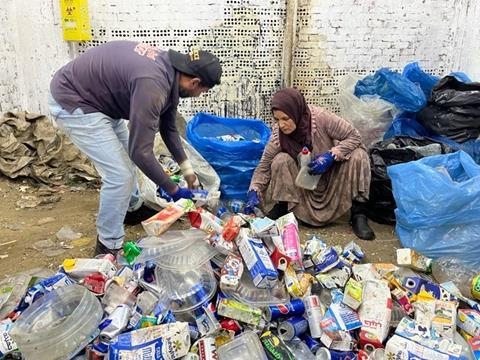
SIG has teamed up with social enterprise Plastic Bank and Deutsche Gesellschaft für Internationale Zusammenarbeit (GIZ) GmbH to unveil a project aimed at changing Egypt’s recycling landscape while increasing security for waste collection workers.
According to a study by PractiQ Consulting, Egypt generates more than 95 million tons of waste annually and currently only 60% of this waste is collected, with less than 20% of that being properly disposed of or recycled. Currently, there is no formalized system for waste collection and recycling.
The partnership between SIG, GIZ Egypt, and Plastic Bank aims to address this through a three-year initiative. The partners hope to collect 700 metric tons of beverage cartons, while also aiming to improve the livelihood for around 1,000 local waste collection workers via blockchain.
The PlasticBank app, backed by the social enterprise’s blockchain-secured platform, provides traceability and transparency in waste collection, empowering waste collection workers to convert every piece of discarded material into a source of revenue.
Apparently, waste collectors will be able to log each collected product via the app to earn incentives deposited directly into their digital wallets and gain access to social benefits including health, work and life insurance, digital connectivity and grocery vouchers. They will then undergo training and receive personal safety equipment for their well-being at work.
SIG says that by streamlining and tracking the collection and recycling of waste, including used beverage cartons, this project also has the broader aim of laying the groundwork for an extended producer responsibility (EPR) model in Egypt, aligning with the Egypt Waste Management Regulatory Authority to weave recycling into the legislative framework and underscoring the important role of packaging manufacturers in environmental stewardship.
This project is supported by the German Federal Ministry for Economic Cooperation and Development (BMZ) funding program “develoPPP” and its special initiative “Decent Work for a Just Transition” implemented by GIZ Egypt.
In a similar project last year, Borealis and Ecopost collaborated to scale up the collection and recycling of plastic waste in Kenya by formalising collecting processes, expanding its recycling capacity and training and recruiting collectors. Ecopost’s model aims to combat waste and provide financial instability amongst Kenya’s citizens by driving collection and recycling while creating jobs as operators, plastic waste collectors, and distributors.
In more recent news, The World Bank issued a a seven-year, $100 million Plastic Waste Reduction-Linked Bond expected to provide investors with financial returns through plastic and carbon credits generated in waste reduction and recycling projects in vulnerable communities in Ghana and Indonesia. The Bond is set to mobilize private capital and help finance projects that aim to benefit the climate and development, with their outcomes measured by the generation of Plastic Waste Collection Credits, Plastic Waste Recycling Credits, and Verified Carbon Units issued on the Verra Registry.
If you liked this story, you might also enjoy:
The Brief: How viable is biorecycling for plastics?
Report: How the top brands are progressing on packaging sustainability
The Brief: Using ocean-bound plastic in packaging – how, why and should we?













No comments yet